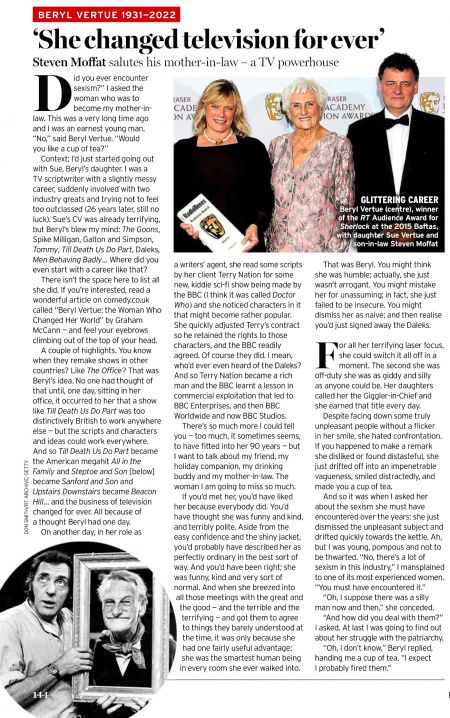She changed television for ever
- Publication: Radio Times
- Date: 2022-02-26
- Author: Steven Moffat
- Page: 144
- Language: English
Steven Moffat salutes his mother-in-law — a TV powerhouse
Did you ever encounter sexism?" I asked the woman who was to become my mother-in-law. This was a very long time ago and I was an earnest young man. "No," said Beryl Vertue. "Would you like a cup of tea?"
Context: I'd just started going out with Sue, Beryl's daughter. I was a TV scriptwriter with a slightly messy career, suddenly involved with two industry greats and trying not to feel too outclassed (26 years later, still no luck). Sue's CV was already terrifying, but Beryl's blew my mind: The Goons, Spike Milligan, Galton and Simpson, Tommy, Till Death Us Do Part, Daleks, Men Behaving Badly... Where did you even start with a career like that?
There isn't the space here to list all she did. If you're interested, read a wonderful article on comedy.co.uk called "Beryl Vertue: the Woman Who Changed Her World" by Graham McCann — and feel your eyebrows climbing out of the top of your head.
A couple of highlights. You know when they remake shows in other countries? Like The Office? That was Beryl's idea. No one had thought of that until, one day, sitting in her office, it occurred to her that a show like Till Death Us Do Part was too distinctively British to work anywhere else — but the scripts and characters and ideas could work everywhere. And so Till Death Us Do Part became the American megahit All in the Family and Steptoe and Son [below] became Sanford and Son and
Upstairs Downstairs became Beacon Hill... and the business of television changed for ever. All because of a thought Beryl had one day.
On another day, in her role as a writers' agent, she read some scripts by her client Terry Nation for some new, kiddie sci-fi show being made by the BBC (I think it was called Doctor Who) and she noticed characters in it that might become rather popular. She quickly adjusted Terry's contract so he retained the rights to those characters, and the BBC readily agreed. Of course they did. I mean, who'd ever even heard of the Daleks? And so Terry Nation became a rich man and the BBC learnt a lesson in commercial exploitation that led to BBC Enterprises, and then BBC Worldwide and now BBC Studios.
There's so much more I could tell you — too much, it sometimes seems, to have fitted into her 90 years — but I want to talk about my friend, my holiday companion, my drinking buddy and my mother-in-law. The woman I am going to miss so much.
If you'd met her, you'd have liked her because everybody did. You'd have thought she was funny and kind, and terribly polite. Aside from the easy confidence and the shiny jacket, you'd probably have described her as perfectly ordinary in the best sort of way. And you'd have been right; she was funny, kind and very sort of normal. And when she breezed into all those meetings with the great and the good — and the terrible and the terrifying — and got them to agree to things they barely understood at the time, it was only because she had one fairly useful advantage: she was the smartest human being in every room she ever walked into.
That was Beryl. You might think she was humble; actually, she just wasn't arrogant. You might mistake her for unassuming; in fact, she just failed to be insecure. You might dismiss her as naive; and then realise you'd just signed away the Daleks.
For all her terrifying laser focus, she could switch it all off in a moment. The second she was off-duty she was as giddy and silly as anyone could be. Her daughters called her the Giggler-in-Chief and she earned that title every day.
Despite facing down some truly unpleasant people without a flicker in her smile, she hated confrontation. If you happened to make a remark she disliked or found distasteful, she just drifted off into an impenetrable vagueness, smiled distractedly, and made you a cup of tea.
And so it was when I asked her about the sexism she must have encountered over the years: she just dismissed the unpleasant subject and drifted quickly towards the kettle. Ah, but I was young, pompous and not to be thwarted. "No, there's a lot of sexism in this industry," I mansplained to one of its most experienced women. "You must have encountered it."
"Oh, I suppose there was a silly man now and then," she conceded.
"And how did you deal with them?" I asked. At last I was going to find out about her struggle with the patriarchy.
"Oh, I don't know," Beryl replied, handing me a cup of tea, "I expect I probably fired them."
Caption: GLITTERING CAREER Beryl Vertue (centre), winner of the RT Audience Award for Sherlock at the 2015 Baftas, with daughter Sue Vertue and son-in-law Steven Moffat
Disclaimer: These citations are created on-the-fly using primitive parsing techniques. You should double-check all citations. Send feedback to whovian@cuttingsarchive.org
- APA 6th ed.: Moffat, Steven (2022-02-26). She changed television for ever. Radio Times p. 144.
- MLA 7th ed.: Moffat, Steven. "She changed television for ever." Radio Times [add city] 2022-02-26, 144. Print.
- Chicago 15th ed.: Moffat, Steven. "She changed television for ever." Radio Times, edition, sec., 2022-02-26
- Turabian: Moffat, Steven. "She changed television for ever." Radio Times, 2022-02-26, section, 144 edition.
- Wikipedia (this article): <ref>{{cite news| title=She changed television for ever | url=http://cuttingsarchive.org/index.php/She_changed_television_for_ever | work=Radio Times | pages=144 | date=2022-02-26 | via=Doctor Who Cuttings Archive | accessdate=21 December 2025 }}</ref>
- Wikipedia (this page): <ref>{{cite web | title=She changed television for ever | url=http://cuttingsarchive.org/index.php/She_changed_television_for_ever | work=Doctor Who Cuttings Archive | accessdate=21 December 2025}}</ref>
